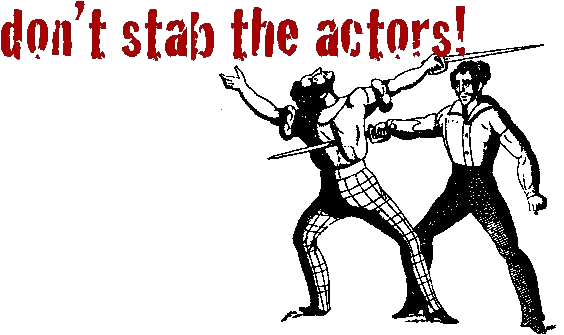Sitting in the Hyatt hotel in Atlanta for Dragon*Con, I'm still a bit perplexed, after having read the first two chapters of the stage combat text (and perhaps the third and fourth, because planes) how cosplayers don't quite understand the element of stage combat or weapon respect. Large weapons are a huge prop for some characters, and the lack of respect from a few cosplayers for their weapons and neighbors was mildly worrisome. At recent conventions, respect for weapons was something I took for granted, but now being aware of it, I see the disrespect at nearly ever corner, as well as heart stopping moments of weight not being under someone's control while striking a pose, or while joking around with other people and doing a "fall." I'm now, also, horrifically aware of the dangerous positions my high-school theatre teacher put us in, as actors and techies, regarding the "simple" falls explained in the book and practiced last week in class. And I'm now aware of how dangerous the filming behind a movie called
Chocolate was.
(The crap reliability of Con internet makes reviewing this video damn near impossible, but here's to hoping this is the correct video! The Hyatt internet was promptly killed yesterday mid-day, and so this is coming from a portable 4G device.
http://www.youtube.com/watch?v=chjDPvvHW0w)
Chocolate is a movie about an autistic girl who has the ability to imitate anything she sees, and due to this, becomes an incredible martial arts fighter. During the end-credits, there was a side bar of outtake after outtake showing just what the actors went through in terms of injury, as the actors were all martial artists. It was common for an actor to get punched in the face, you'd here the occasional pop of a shoulder or rib with the impact of a very dangerous blow. At the time of watching it, I thought, "damn, what people go through to be actors!" Now my thought is, "damn, whoever was in charge of safety should be fired."
I want to learn stage combat purely because I want to understand it, and make things look cool. I'm not a theatre major, but I have done extra work out in LA, and saying I know some stage combat is helpful for that pretty acting resume. Additionally, the bit on spatial awareness and status was absolutely fascinating! A friend of mine a few years ago had a project for one of her sociology classes where she decided to challenge the social expectation that she move for other people while walking to classes. She would refuse to advert her course, and would run into people if the case allowed. Giggling, she relayed the slew of names she had been called, and I'd tried a number of times to practise this myself, but I generally still will move for people.
The safety seems like common sense, but it's amazing how that does typically go out the window for authenticity. My sister was in a show, and a doorslam made a glass fall off a shelf and shatter across the floor. Because there was no break in the scene or action (as this show, Killers and Other Family, didn't have an intermission, and once the actors were onstage, they were onstage. There was some "picking up" of pieces by my sisters character, but you know that's never enough) the actors had to adjust combat bits around the glass, and as there was quite a lot of violence, it was incredibly scary for me as an audience member knowing there was glass on the floor.
I love the writing style of the book, and I can't wait to learn safe combat technique!





